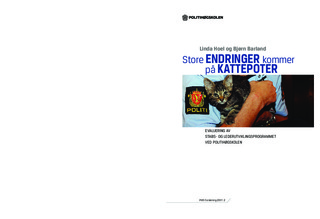| dc.description.abstract | The evaluation of the Staff and Leadership Development Programme has a two-part mandate. Firstly, the report will evaluate to what extent the programme has reached its objectives. Secondly, the evaluation wishes to investigate to what degree participants of the programme receive a lasting education. By ‘lasting education’ we mean internalized behavioural change in the areas on which the programme focuses.
The evaluation is based on data consisting of observations of major staff practices and interviews with a selection of staff members. Through this data, the report highlights most aspects of the Staff and Leadership Development Programme as is experienced by the members of staff we interviewed. In order to limit the scope of the report, the learning points of the programme, which are largely linked to the task of staff functions and responsibility in severe police assignments, are emphasised. SAR practices1, which deal with preparedness and cooperation with collaborative, civil agencies, are less touched upon.
Our evaluation draws attention to the strengths and possible shortcomings of the current Staff and Leadership Development Programme. To the extent that some of our findings should lead to change, it is not defined, in this report, who will make these changes; the Norwegian Police University College develops the programme in close cooperation with the National Police Directorate, and this can provide a limited scope for possible changes.
Certain findings mentioned in this report have already been changed or removed in the content of the new programme. The Staff and Leadership Development Programme must also be seen in a developmental context associated with the policing profession, where more and more courses and training programmes are converted to a vocational education, based on research and experiential knowledge, and skills, as well as work requirements and assessments that meet the demands of the Norwegian Police University College as a vocational college. This has been a continuous development at the Norwegian Police University College for 10-15 years. | nb_NO |
